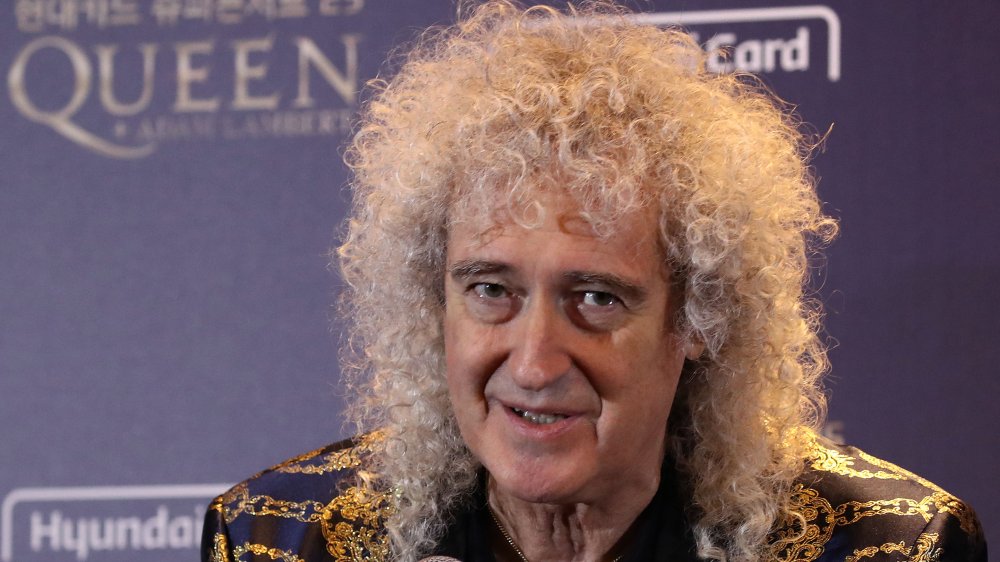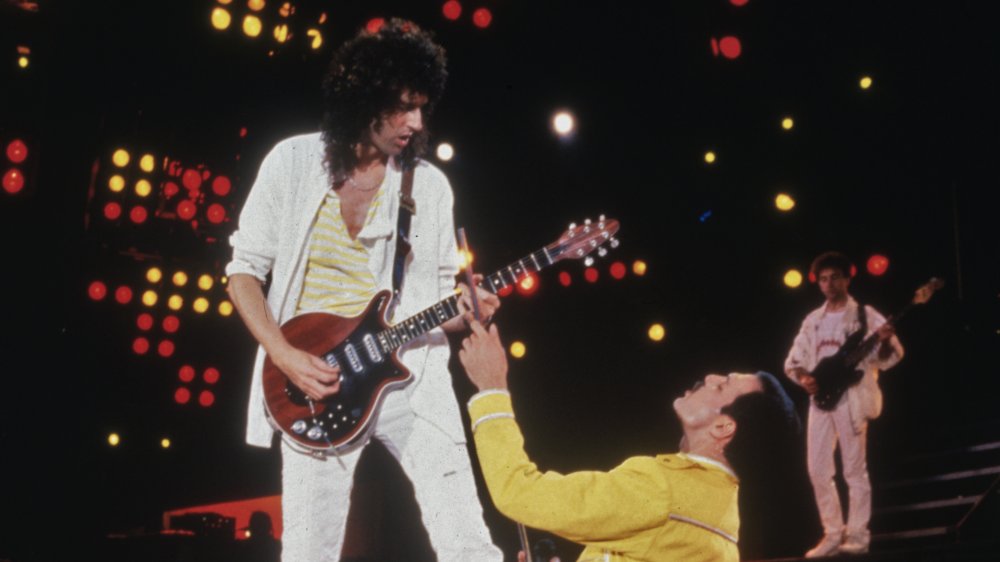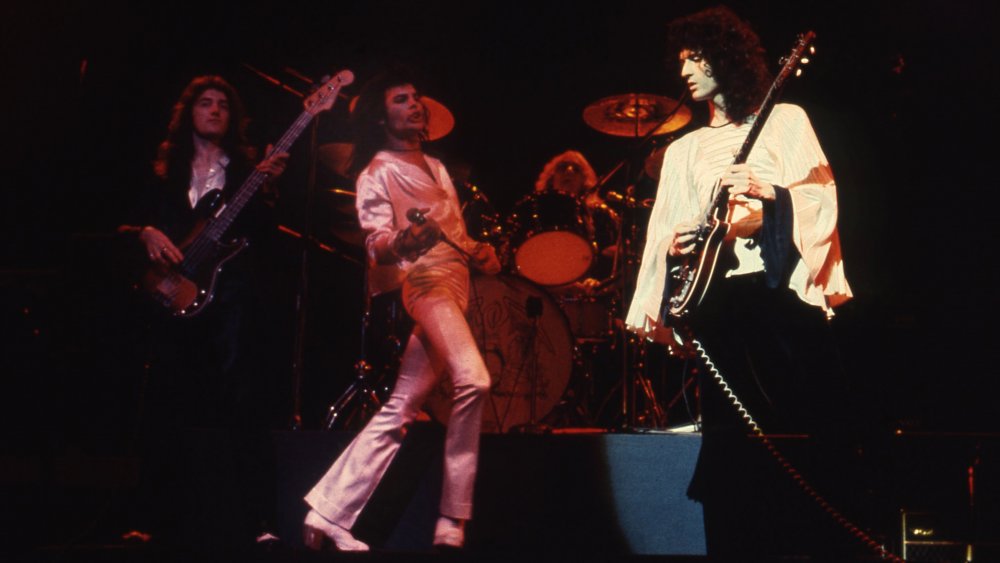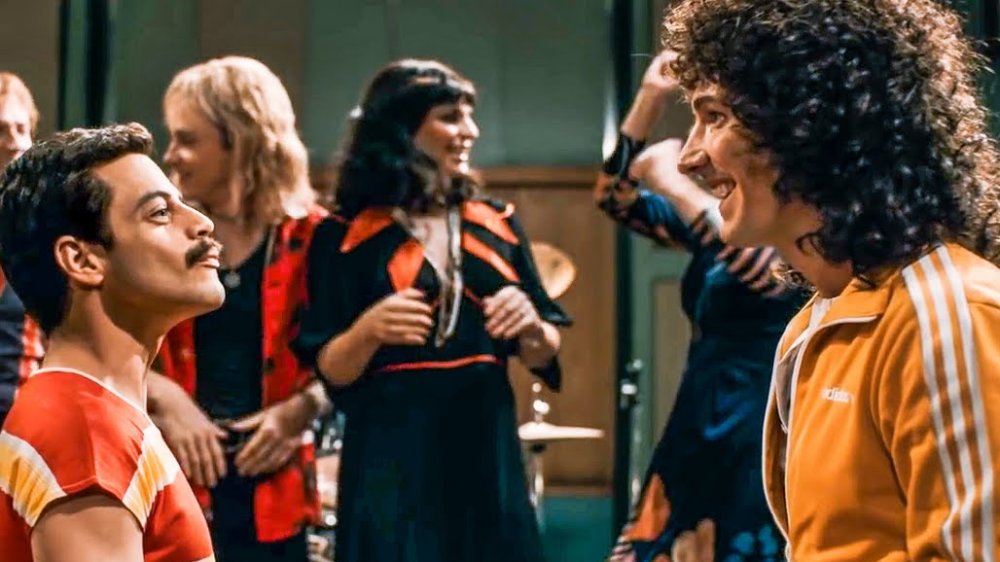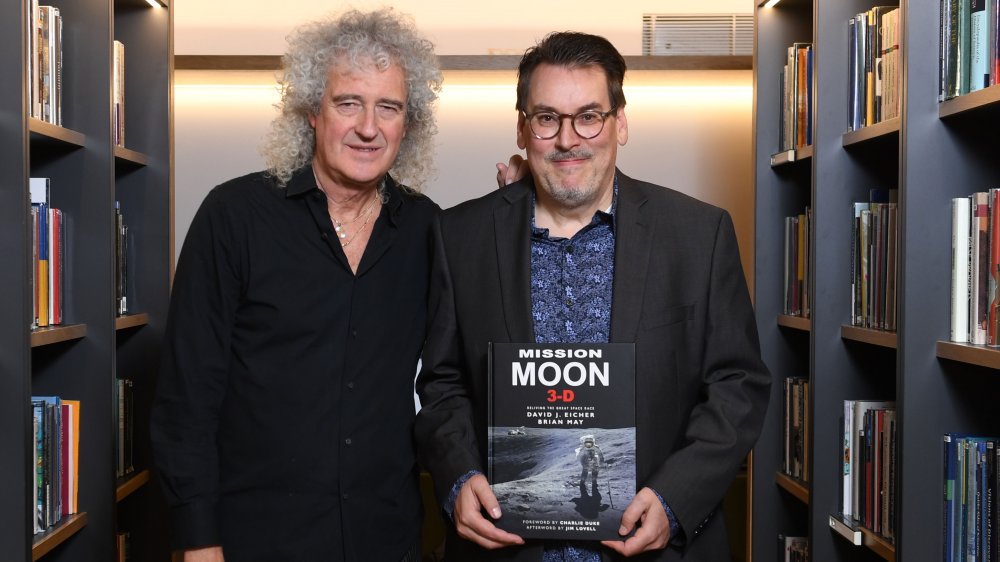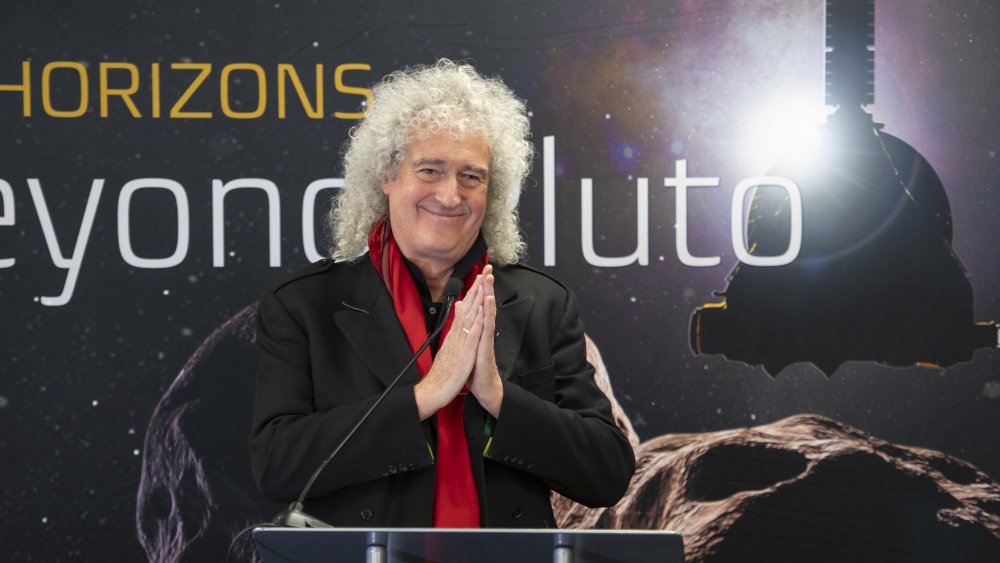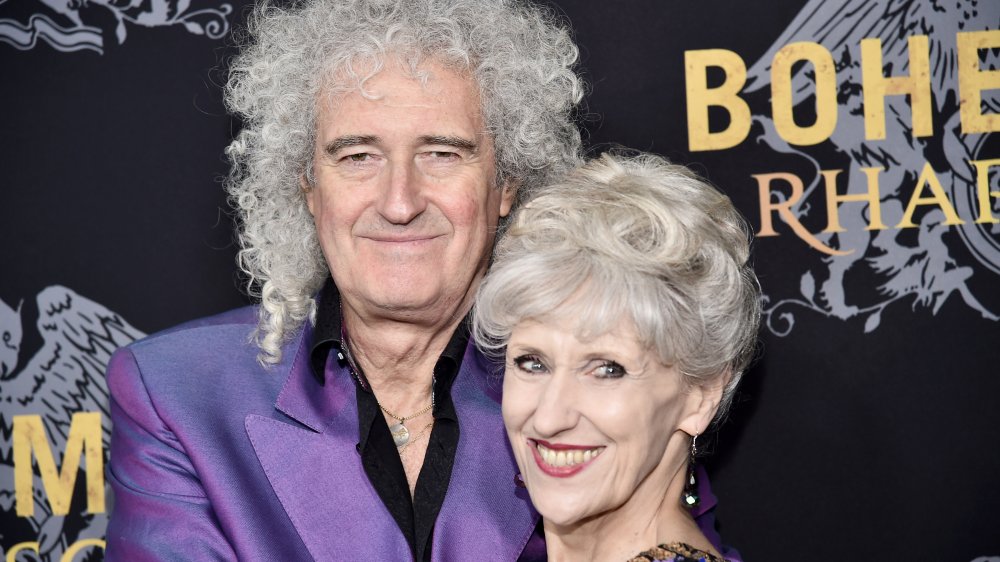The Untold Truth Of Queen Guitarist Brian May
We may receive a commission on purchases made from links.
Every pioneering rock band and charismatic frontman needs an out of this world guitarist, and that's just what Brian May, CBE, PhD, brought to British band Queen. In more ways than one, as we'll find out.
While Freddie Mercury's unparalleled vocals made Queen songs stand apart from any other band (sorry Adam Lambert), it was May's guitar playing and songwriting that provided Mercury with the material that made those performances possible. In 2015, May was voted into the 26th spot on Rolling Stone's list of the 100 Greatest Guitarists by a panel of pros (including, to be fair, May himself.) In the listing, guitarist Steve Vai described May as "walking on higher ground," saying he was the only guitarist with a style that can't be mimicked.
What you may not know is that many of Queen's most famous hits were written by May, including "We Will Rock You," "Flash" (aah aaah), "Fat Bottomed Girls," and "Who Wants to Live Forever." You may also not know that May, now in his seventies, has traded life on the road for a posh home in the English countryside, where he spends his time caring for animals and studying the skies at night. For the untold truth of Queen guitarist Brian May is that even rock stars can be animal-loving space nerds at heart.
Don't mention his hair
Brian May is rightly most famous for his guitar skills, but his second best-known feature is his mane of curly hair. However, he has mixed feelings about his iconic locks. In a 1998 interview with Q magazine, he admitted, "Sometimes I wish I had a paper bag over my head and people just listened to the music... I do think I'm in danger of becoming a prisoner of my own hair."
May explained that although he's considered getting his hair cut for that very reason, he likes it because it's "unfashionable." He also enjoys upending people's assumptions: "People that aren't into Queen, see me and immediately assume that because I look this way I can't have anything relevant to say about their lives. And I like to surprise them by proving that it's not the case," he told Q.
Given that he's been dealing with hair-related comments since the mid-'70s, it's understandable that Brian May gets grumpy when people bring it up. Even fellow British rock icons. In 2007, Madness singer Suggs made a joke about May and his second wife Anita Dobson's similar curly hairstyles. May didn't see the funny side. On his website, he called the joke "sad" and "old," adding, "Ha frigging ha. How disappointing people can be." He won't be in conditioner commercials any time soon.
Brian May built his first electric guitar
Brian May didn't splash a lot of cash on his first electric guitar. He made it himself with his dad in 1963, when he was 17, using materials they had lying around. For instance, he told Absolute Radio that the neck was made from a then-100-year-old mahogany fireplace, and the dock markers came from May's mum's button box. He explained that they undertook the DIY project because they couldn't afford to buy a guitar. "We thought, 'We can make a guitar, and maybe we can make something that's better than anybody's ever made,'" May recalled. He wasn't just being arrogant. Brian May's father, Harold, was an electronics engineer and Royal Air Force (RAF) veteran, who helped develop the landing gear for Concorde and built all the appliances in their household, including the TV.
The guitar is nicknamed the Red Special, after the color of the wood, or the Old Lady. Despite its humble origins, this was more than just a starter guitar destined to be traded in for a shiny store-bought one once rock stardom happened. May has played the Red Special on every Queen album, and he still plays it on tour (where it has its own bodyguard.) He's started selling replica versions under the brand name Brian May Guitars. "We had no idea how big a part the Red would play in my life," May told the Guardian.
Brian May has a PhD in astrophysics
That's Dr. Brian May, thank you. While honing his natural talents as a musician, in 1965 May landed a place on the undergraduate astrophysics course at Imperial College London — currently one of the top 10 universities in the world — where he earned a bachelor's degree. He then started working on a PhD in astrophysics, also finding time to join several bands, one of which eventually became the original lineup of Queen: May and Mercury with John Deacon on bass and Roger Taylor on drums. In 1971, the band was going well enough that May put his PhD on hold.
This caused tension with his dad, who'd helped him build his first electric guitar but didn't understand his son's musical ambitions. "Dad was mortified... He thought I was throwing away my education. But, in the end, the pull of the music was too hard to resist," May told the Guardian.
Brian May returned to his stardust studies eventually, working from what he described to Time (via CNBC) as "a little office in Imperial College." In 2007, he completed his thesis (which you can still buy), titled "A Survey of Radial Velocities in the Zodiacal Dust Cloud," and officially received his doctoral degree from Imperial.
Freddie Mercury and Brian May were roommates before they were bandmates
Queen was not Brian May's first rock 'n' roll rodeo. While studying at Imperial College London in the mid-'60s, May played in a cover band called 1984, alongside bassist Tim Staffell. The pair formed their own band, Smile, in 1968, and recruited reluctant dentistry student/enthusiastic drummer Roger Taylor.
Freddie Mercury — then going by Fred Bulsara — was a Smile fan who became a friend of the band, and then Taylor and May's housemate. He and Taylor even ran a market stall together. (And that's just one of the ways the Bohemian Rhapsody movie lied to you.) Mercury was a regular at Smile gigs: Brian May recalled that he would come up to the band after shows to give them feedback about their performance, specifically their image. According to Rolling Stone, he would shout from the crowd, "If I was your singer, I'd show you how it was done."
Mercury got his chance when Staffell quit. As May remembered in an interview on British TV, "The group broke up and Freddie said, 'I can sing'... we tried it out and by God, he could sing. And he played amazing piano." In April 1970, May, Taylor, and Mercury regrouped into a new band, recruiting bassist John Deacon in 1971.
Brian May suffered several injuries in 2020
Brian May has mostly left the wilder parts of his rock star days behind him, but even his gentler lifestyle has left him needing medical attention. On May 6, 2020, he revealed on Instagram that a couple of days earlier, "I managed to rip my Gluteus Maximus to shreds in a moment of over-enthusiastic gardening."
The injury turned out to be worse than May and his doctors thought. In a later Instagram video, he said that a week after the accident, he was still in agonizing back pain. Another MRI revealed that he had a "quite severely compressed" sciatic nerve, which he received treatment for. "I'm a lot better now. I'm actually free of that terrible pain," he clarified.
During all this, Brian May had what he described as a small heart attack. "It's not something that did me any harm," he said in the post, explaining that he experienced chest pains and tightness, a sensation in the arms, and sweating — common heart attack symptoms — for about 40 minutes. It was determined that he had three blocked arteries. He passed on open heart surgery, instead having three stents put in. He said he's back on form and thanked the doctors who operated on him "from the bottom of my heart" — literally.
The show did not go on when Brian May got sick in 1974
In March 1974, Queen released their second album — Queen II — and headlined their first UK tour. They also started to look for success outside the UK, according to Louder. They were booed off stage at their first international gig in Australia, but found a warmer welcome in America, touring in support of Mott the Hoople. Their first American gig was in Denver, Colorado, in April. But just a month later, Brian May fell seriously ill with hepatitis.
Queen pulled out of the rest of the tour while May was repatriated back to England to recover. The guitarist said he felt that he'd let the band down during their important win-over-America tour, and set to work writing from his hospital bed. And he wasn't out of the woods yet. After spending six weeks recovering, Brian May eagerly rejoined his bandmates in the studio, only to get sick again, this time with a stomach ulcer. By the time he got back to work, he felt disconnected — in a good way. "It was very weird, because I was able to see the group from the outside, and was pretty excited by what I saw," he told Louder.
Brian May wrote 'We Will Rock You' for the band's audiences
Learning the true stories behind popular Queen songs makes fans love them even more. And the story of "We Will Rock You" is especially heartwarming because Brian May wrote it specifically to get the audience involved.
He told Billboard that he'd loved watching Queen's audience sing along with the band at a gig in Bingley Hall near Birmingham, UK — something that was considered uncool among Serious Rock Fans at the time. He wanted to embrace that participation by creating a song in which the audience could lead the band by stomping their feet and clapping. May was also inspired by playing in the Boston Garden, a since-demolished arena in Boston, Massachusetts, which had a wooden floor and ceilings that exaggerated every sound the audience made. "I went to sleep and woke up with 'We Will Rock You' in my head," he said.
Back in the studio, the band put the song together in a process similar to the scene shown in Bohemian Rhapsody, but with more technical wizardry. Brian May had them stamp on the floorboards and clap and built up the sound with delays and backing vocals, so that it would sound like a real crowd. "It worked like a dream," May told Billboard.
Brian May has written multiple books
You've probably sung along to something that came from Brian May's head, but he's written more than songs. May has authored and co-authored numerous books on a broad range of topics, including the historical dangers of crinoline fabric, his homemade electric guitar, and space. For Bang! A Complete History of the Universe, May teamed up with astrophysicist Chris Lintott and his hero Patrick Moore, presenter of long-running British astronomy TV show The Sky at Night.
One of May's more esoteric interests is 3D photography. In 2008, May restarted the London Stereoscopic Company, a once thriving photographic company originally founded in London in 1854, which sold 3D photos (also known as stereoscopic photos) and the stereo viewers required to view them. May not only collects these Victorian souvenirs, he takes his own, including some of Queen which were published in a book in 2019. He's also co-authored a book showing 3D photos of stars, titled Cosmic Clouds 3-D: Where Stars Are Born.
Another of Brian May's stereoscopic books is a little more out there than space. Diableries showcases stereoscopic pictures originally published in 19th century France, showing devils engaging in debauched behavior of various kinds. May describes it as "a labor of love," and compares it to watching Avatar, "but in a Victorian way."
Brain May would rather be remembered as an animal rights activist
Music fans know Brian May primarily as a guitarist, rock star, and hair icon, but if he had his way, he'd prefer to be remembered for the work he's done to help protect wildlife.
May is an avowed animal lover. He started the Save Me Trust in 2010: the organization works to protect animals in need, especially foxes and badgers who are at risk of hunting and culls, as well as conserving woodland. May has been a vocal campaigner against the culling of badgers. In 2019, he stated that he won't play major UK music festival Glastonbury because founder Michael Eavis supports badger culls. In 2020, May praised the UK's government's plan to limit badgers' ability to spread TB through vaccines.
He's also taken caring for animals at home to a new level. Brian May has an animal sanctuary — Harper Asprey Wildlife Rescue — on his estate in Surrey, England. The sanctuary nurses sick animals back to health, including hedgehogs, badgers, and owls. May told the Times (via NME) that watching animals brings him tranquility after his hectic rock star years. He added that he understands that people will probably remember him most for Queen, "but I would much rather be remembered for attempting to change the way we treat our fellow creatures."
Brain May wants us all to pay attention to asteroids
Don't panic: the truth of Armageddon is that it's highly unlikely that an asteroid that size is going to collide with the Earth. But Brian May wants us to know that asteroids are a real danger. In 2014 he co-founded Asteroid Day, which happens annually on June 30, to promote awareness of objects that are coming perilously close to Earth.
May is not totally anti-asteroid, however. He even has one named after him: Asteroid (52665) Brianmay. And he's not the only Queen member with a namesake in the heavens. In 2016, May announced that the International Astronomical Union's Minor Planet Center had named an asteroid discovered in 1991 — the year of Mercury's death — Asteroid 17473 Freddiemercury, in honor of what would have been the singer's 70th birthday.
Brian May isn't just looking at asteroids, he's taking 3D pictures of them. He was a co-author of a paper published in the scientific journal Nature on May 27, 2020. On Instagram, May described it as "a new paper on the origins of the shape of 'rubble pipe' asteroids like Bennu and Ryugu," and explained that he contributed the stereoscopic (3D) imagery, along with researcher Claudia Manzoni. Not your average musician's Instagram post from a not-average musician.
Brian May wrote the song 'Scandal' about the British tabloids
The part of fame most famous people could do without is the gossip around your love life. Brian May experienced this firsthand with his second wife, English actress Anita Dobson. The pair met at the premiere for Down and Out in Beverly Hills in 1986, and according to an interview they did on British TV, they've been "on and off" ever since, marrying in 2000. However, May didn't officially divorce his first wife, Chrissie Mullen, until 1988.
The press attention May and Dobson received when their relationship was revealed — along with stories about Mercury's personal life — inspired Queen's 1989 song "Scandal." In an interview in 1989, May said that seeing stories about him and the band in tabloids was devastating: "I thought it would never happen to me... It actually screwed me up completely."
The couple insists that they initially resisted being together, but Dobson later told BBC Radio 4 that she knew May was the love of her life right away. He felt the same. "Ever since I first set eyes on her, she's been an essential part of my life," he told the Mirror in 2002. Dobson inadvertently inspired another Queen song, "I Want it All:" May explained that the title was one of her favorite phrases.
Brian May has talked about his struggles with depression
Brian May has been open about struggling with depression at various points in his life. One especially dark time started in 1991 when May's father died, followed soon after by his friend and bandmate Freddie Mercury. Queen had "finished," as May put it to the Daily Mail, although the untold truth of Queen is that they never officially split up. Even though they later reunited, at the time, May said, it felt like he was losing his family.
In 2002, May told the Mirror of this period, "I thought my life was over. I was totally and utterly depressed... It's like you're paralyzed... Even music didn't get to me in the worst moments. Depression would clamp down like a fog." His second wife, actress Anita Dobson, got him through. "If I didn't have Anita, all the therapy in the world wouldn't sort me," he explained.
Although he recovered from that period, Brian May still gets hit with waves of depression sometimes, especially in the holiday season. In an Instagram post from January 2, 2020, he wrote, "There's something about this time of the year that paralyses me. Depression, hopelessness, fear... I get engulfed." Being a rock star doesn't fix everything.

